Last Updated on March 4, 2024 by teamobn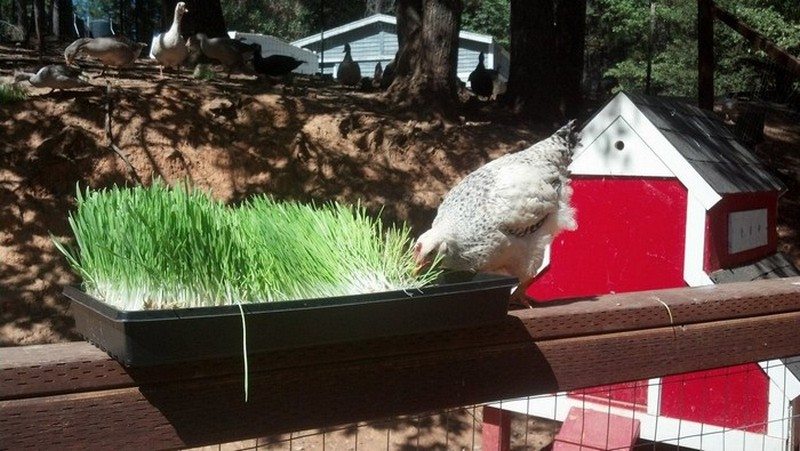
Just like any pet, chickens deserve occasional treats too. They may not be as affectionate as your dog but they certainly help a lot in the backyard. The treats are not just given to make them happy, they serve a purpose too. And homemade treats help in keeping your chooks healthy all year round.
In the winter, treats serve as a substitute source of nutrients for the plants they love to eat, which are hibernating and buried in snow. It keeps them preoccupied during winter, hydrated and cool in the summer.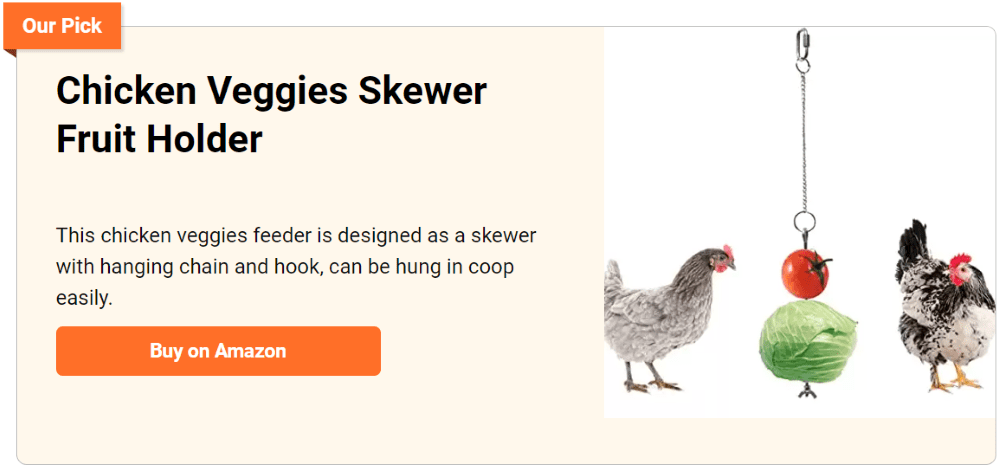
Now there is plenty of chicken treats out there available for purchase, but your chooks can also eat certain types of human food. You can make homemade treats for chickens yourself by using ingredients already found in your kitchen. It’s a great way to make use of excess food (instead of throwing them in the trash) and save money!
If you are new to raising chickens or are looking for new ideas, this list will help. So keep scrolling and learn the different ways you can keep your chooks entertained and healthy with treats!
Click on any image to start the lightbox display. Use your Esc key to close the lightbox. You can also view the images as a slideshow if you prefer ![]()
Homemade Treats for Chickens You Should Make Today!
Frozen Muffin Treats
For a quick and easy summer treat, put a small amount of corn kernel in each muffin cup and add water. Keep in the freezer for a couple of hours and that’s it! You can also do this idea using various ingredients. (See the list of foods chickens CAN and CANNOT eat below this page.)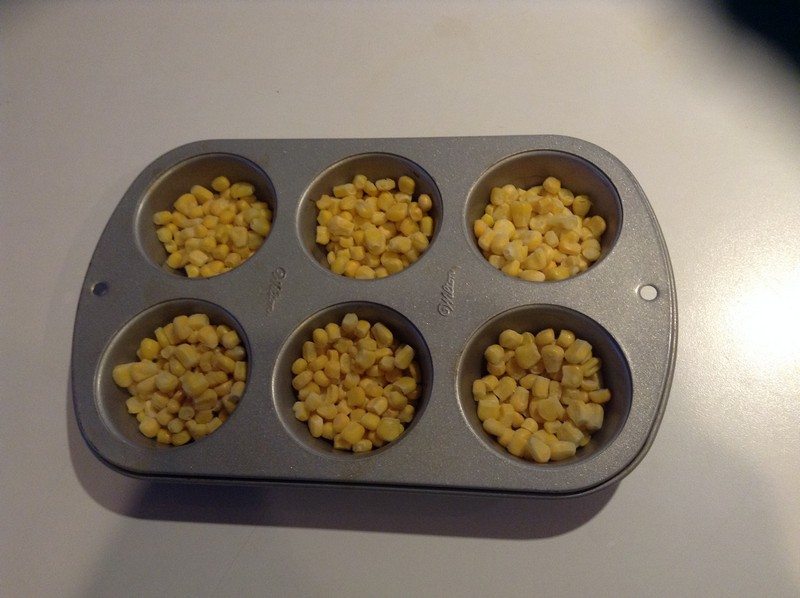
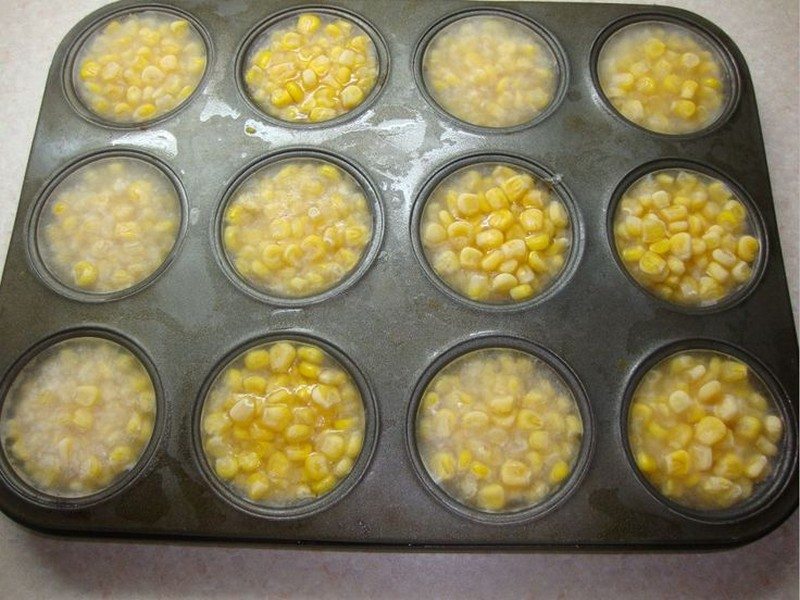
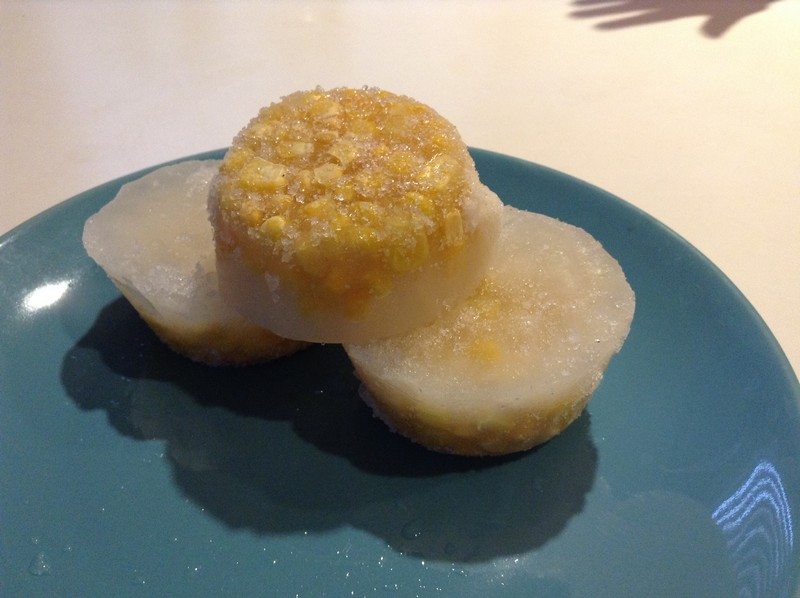
Mealworms
You can farm your own mealworms. There are some articles and guides available online to learn how to do it. But if you want, you can simply buy packs of mealworm treats.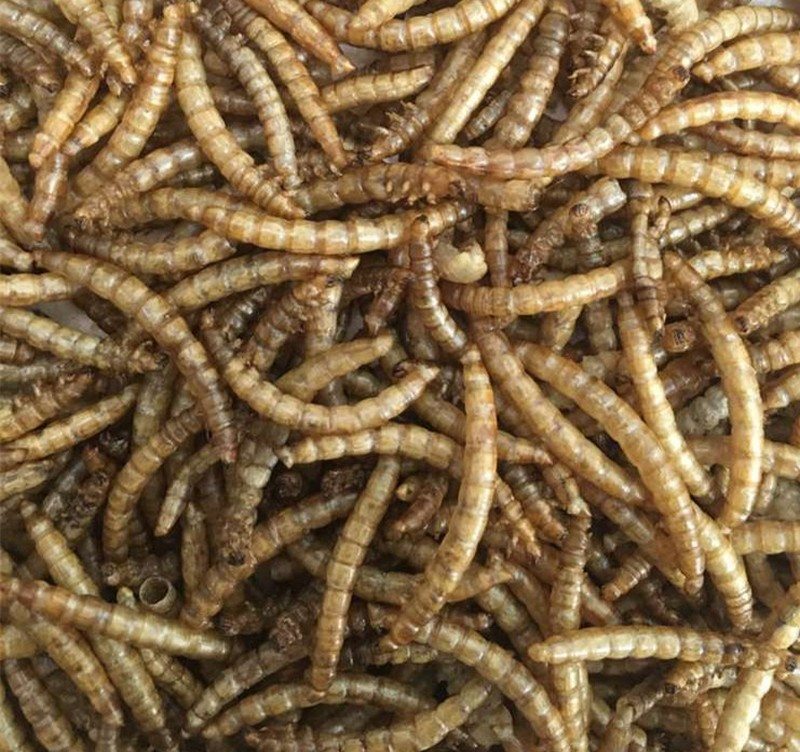
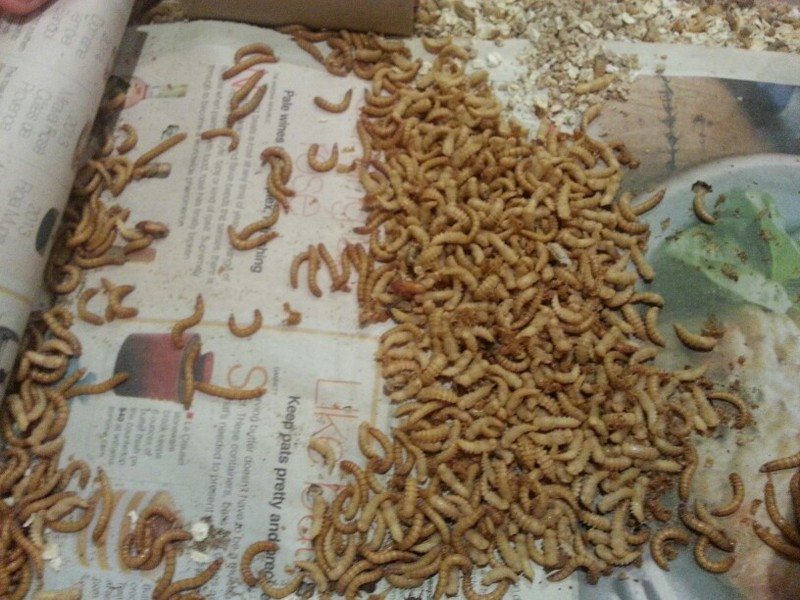
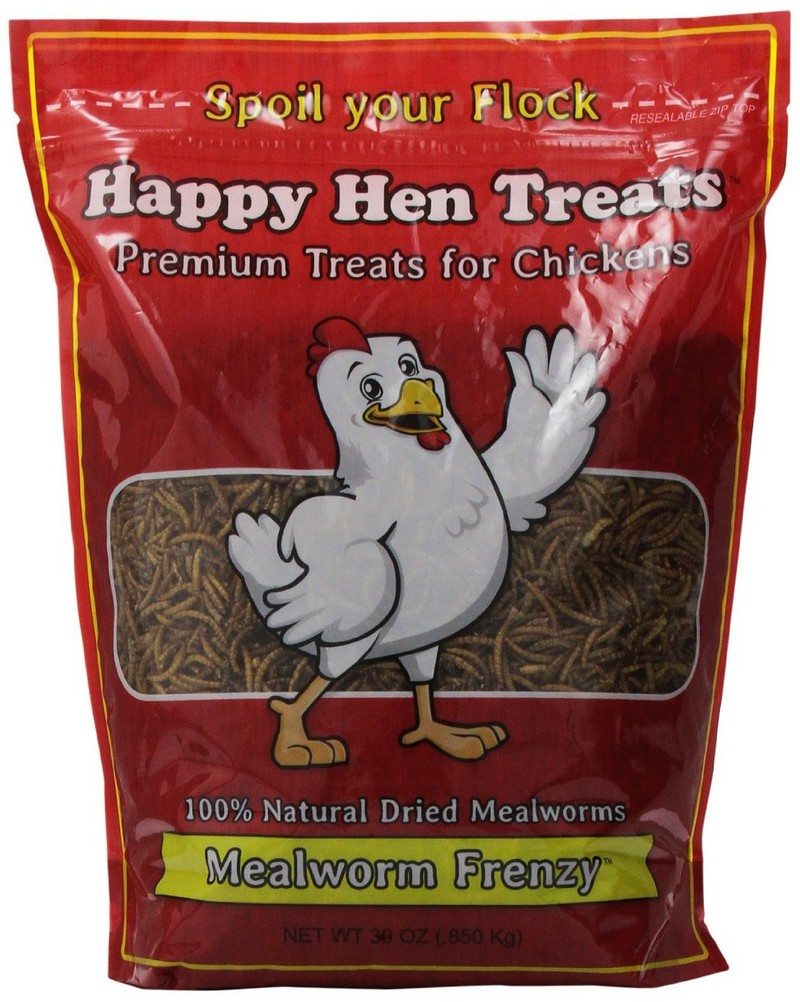
Pumpkin Seed Treats
Got some pumpkins? This idea is perfect during the Halloween season, especially if you or you know someone who carves pumpkins! Great way to save the seeds and scraps. 🙂 Simply make pumpkin chunks, blend the seeds into smaller pieces, and a little bit of water and organic feeds.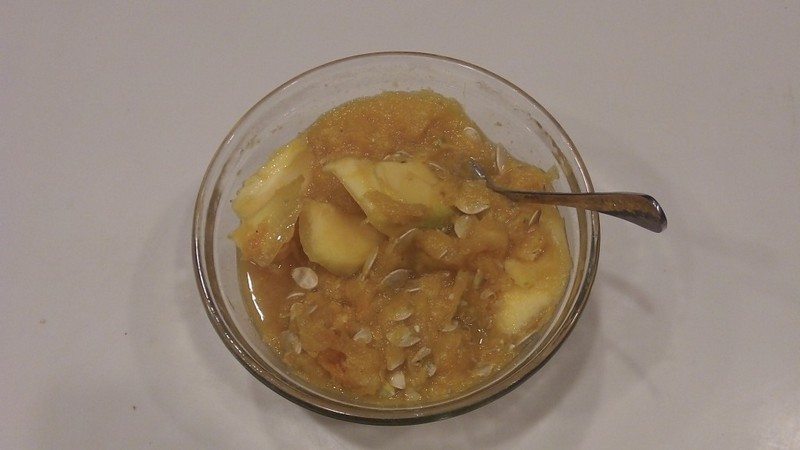
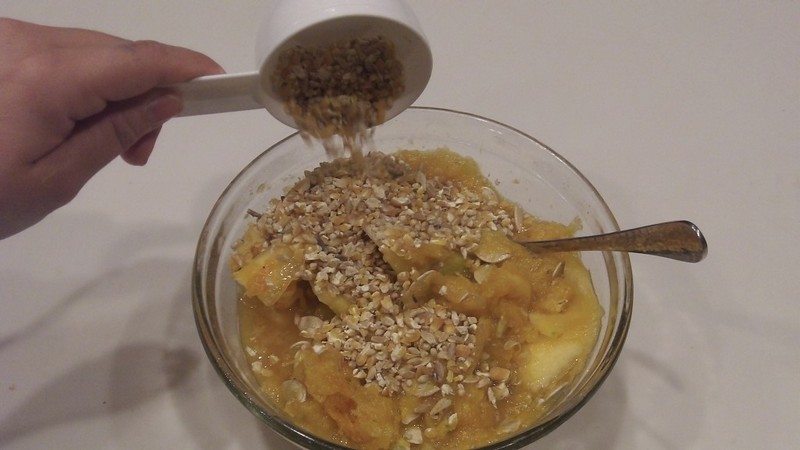
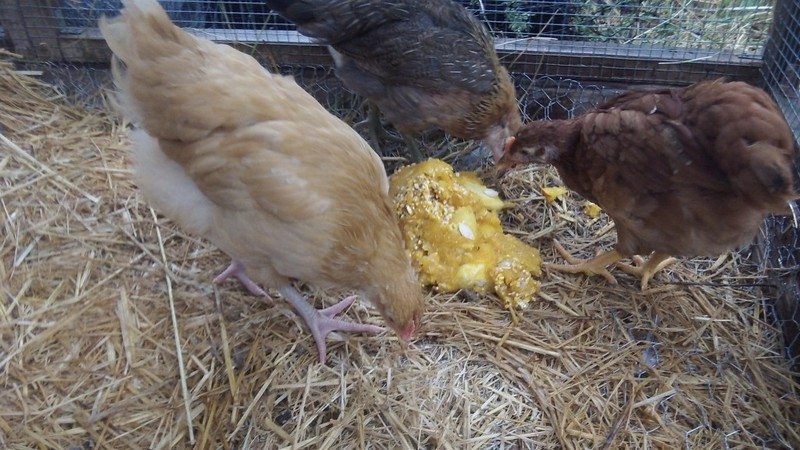
Peanut Butter Cakes
If you are into baking here’s a really good-looking recipe from Janice Cole that you can make! Just remember not to confuse this with the ones you made for the family because these peanut butter cakes are made of chicken feed and dried mealworms along with salt-free peanut butter, old-fashioned oats, raisins, and dried cranberries. 😉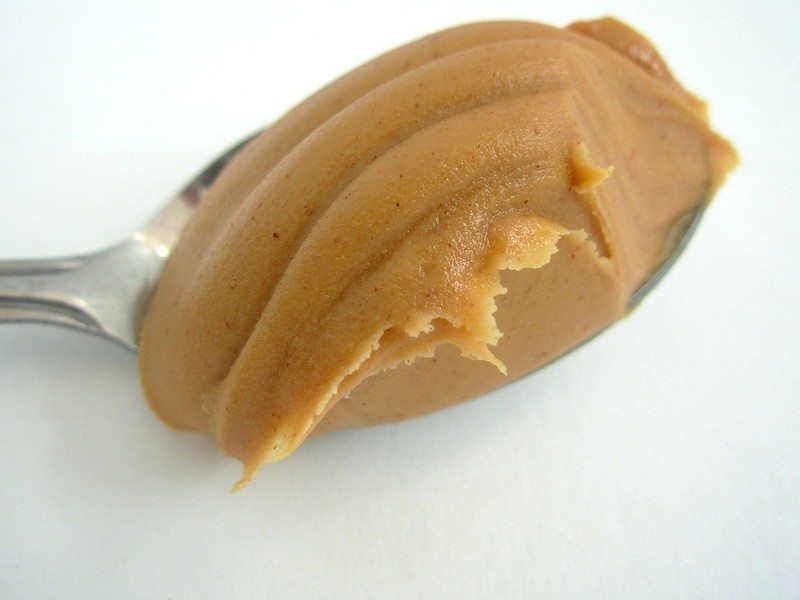
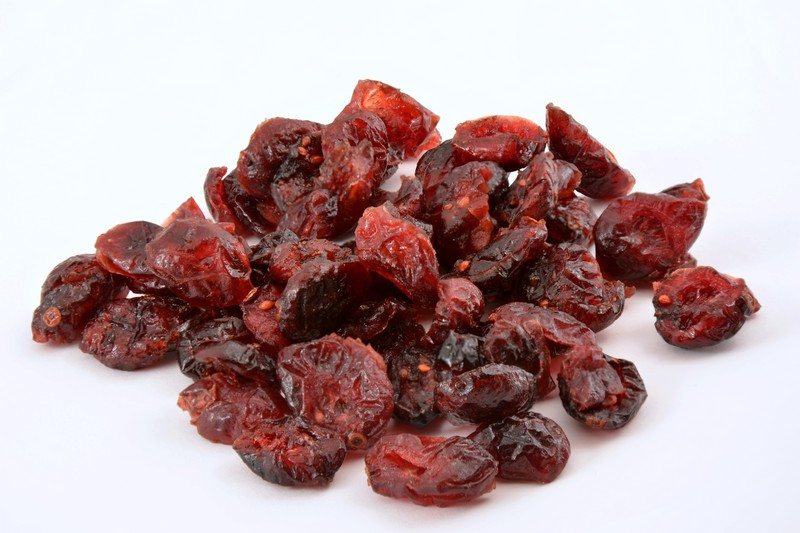
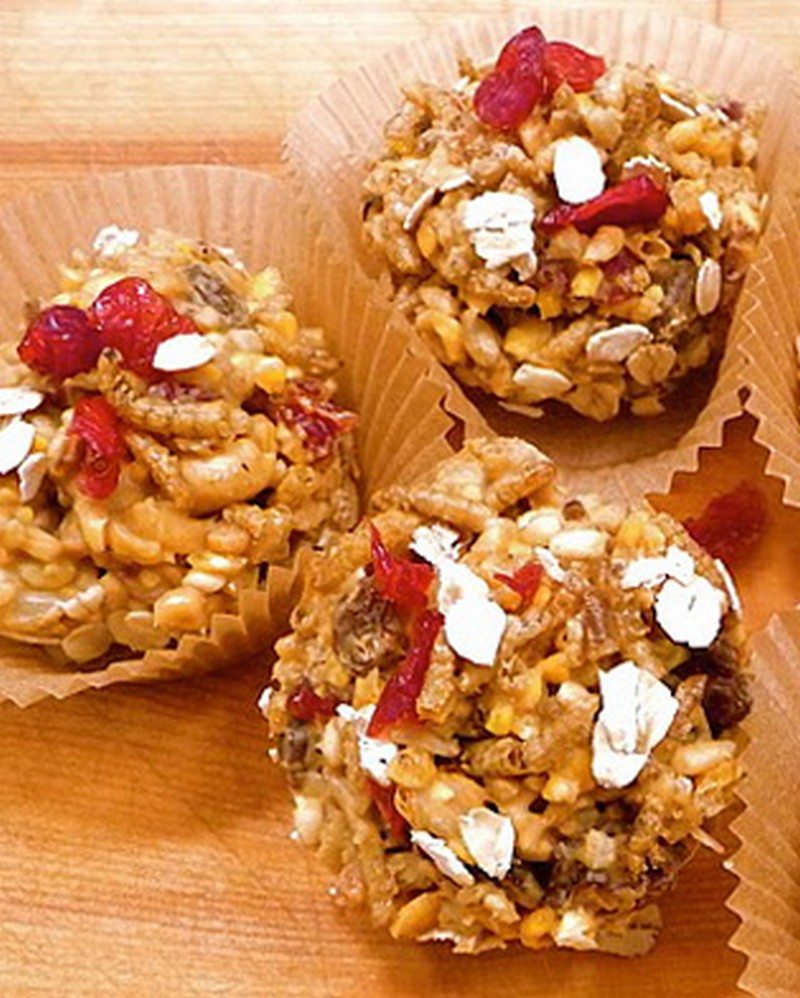
Fodder
Now here’s something we highly recommend that you have if you’re raising chickens. By growing your own fodder system, you don’t have to worry about your livestock’s food at whatever time of the year it may be. It’s easy, low-maintenance and you definitely don’t need large cultivated land to do it. You can learn more about it here.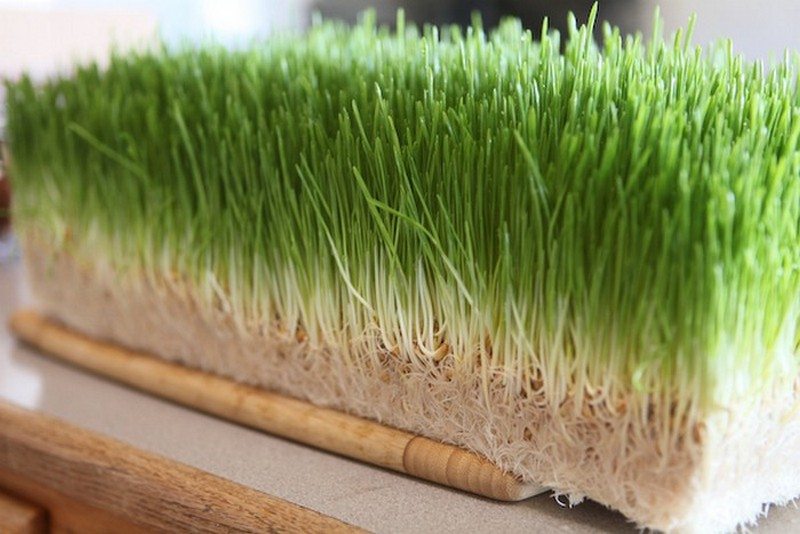

Vegetable Garlands
Bought too many vegetables for your next meal? Give it to your chooks as a treat! This vegetable garland idea will keep them from getting bored.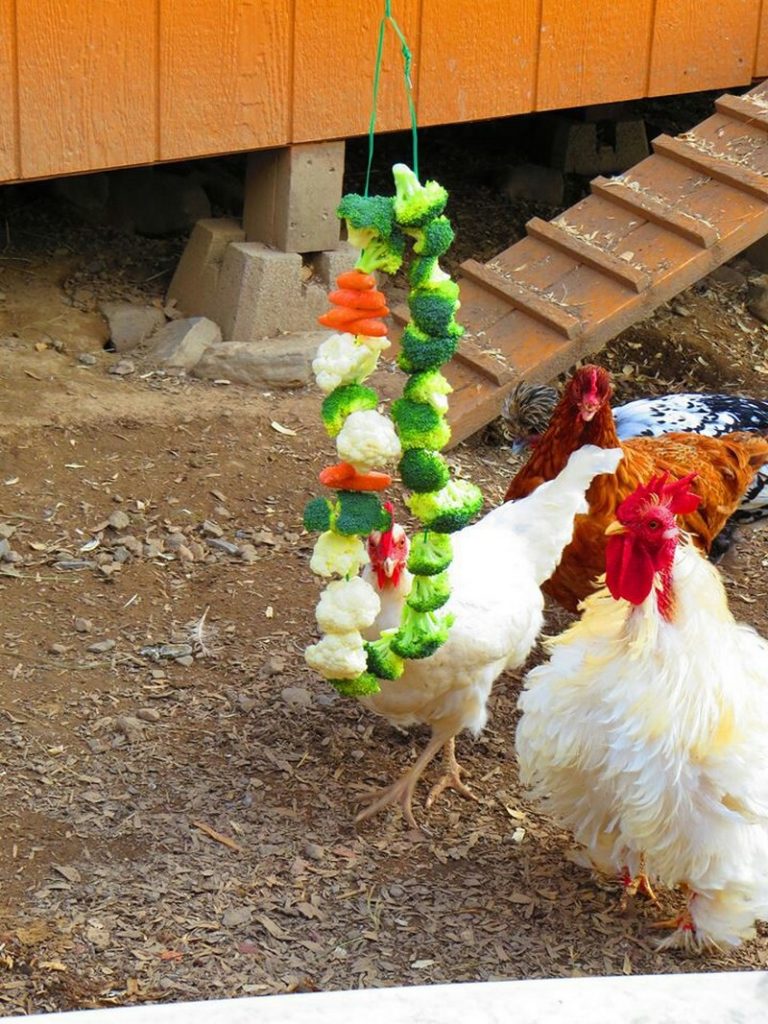
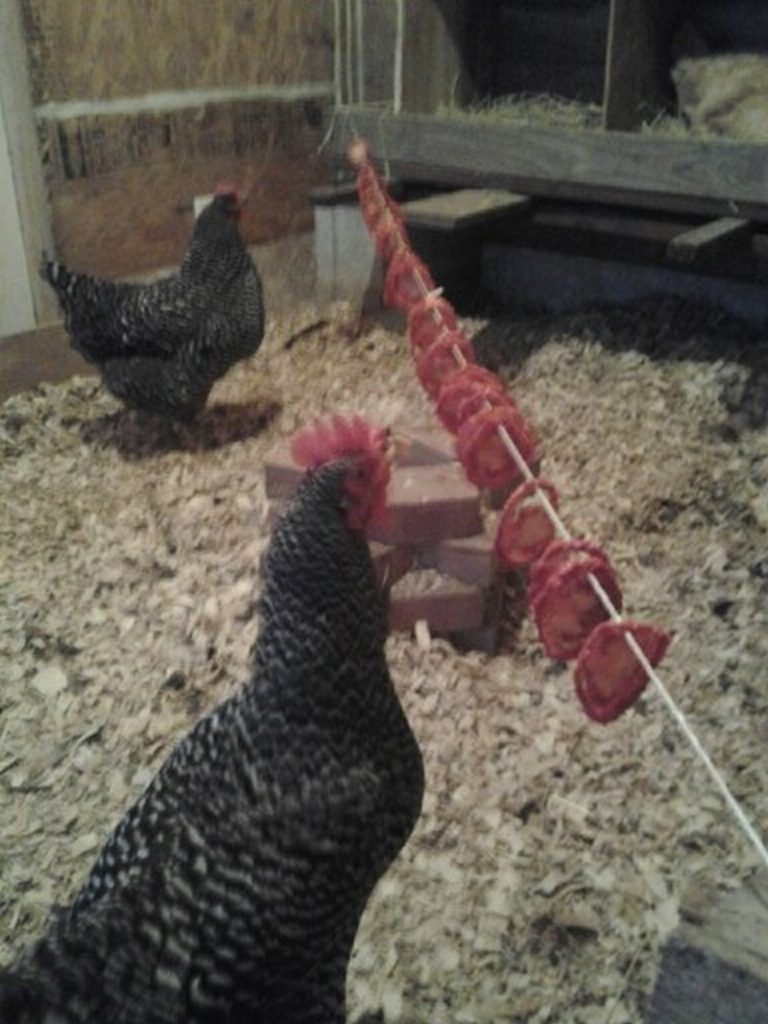
Oatmeal Balls
Another idea for the bakers out there! The next time you bake oatmeal cookies for the kids, don’t forget to make this version for your chooks afterward.
Hanging Chicken Scratch Feeders
This idea is simple but perfect for the winter. It keeps the food off the snow and it’s an entertaining way for the chickens to eat their treat. 🙂 Here is the article for the hanging chicken scratch feeders if you are interested.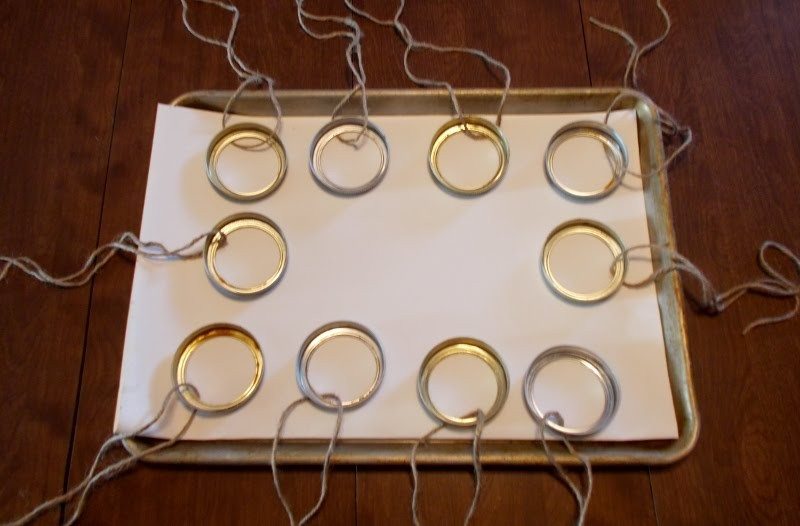
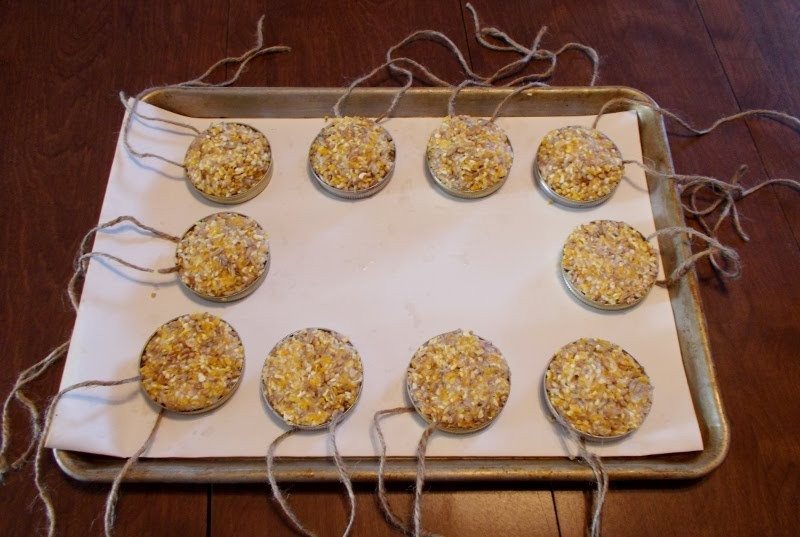
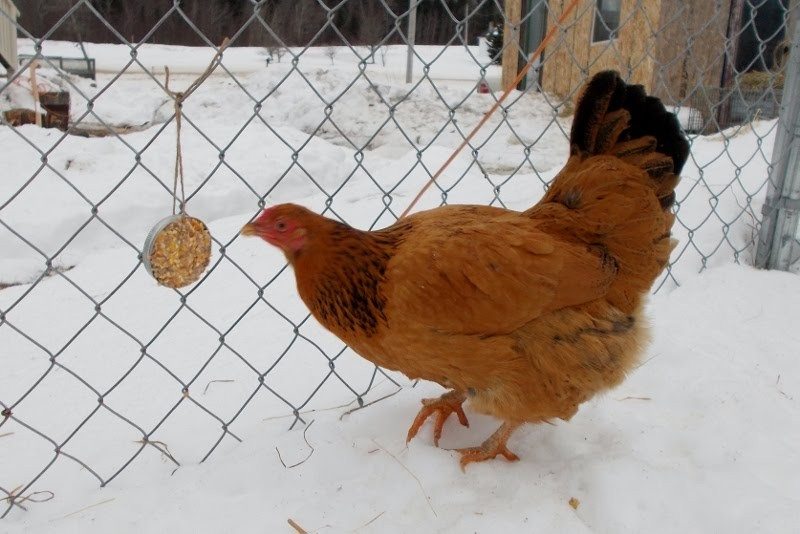
Now that you have several ideas on how to make fun and healthy treats for your chickens, how about getting inspiration from the list above to create a new kind of treat? Show your love to your backyard chickens by making your very own version! To further guide you, here’s a list of what chickens can and cannot eat…
What They Can Eat
Vegetables
asparagus, beans (must be cooked), beets, bell peppers, broccoli, Brussel sprouts, cabbage, carrots, cauliflower, corn, cucumbers, eggplant, garlic, peas, pomegranate, popcorn (popped) potatoes (cooked, avoid peels), pumpkins, sprouts, squash, tomatoes, turnips (cooked)
Fruits
apples (including seeds), bananas (without the peel), cherries, melons, peaches, raisins, strawberries, blueberries, blackberries, raspberries, cranberries, seedless grapes
Bread/Grain
bread, grits (cooked), rice (cooked), oatmeal (raw or cooked), pasta (cooked), quinoa, sugar-free cereal (like Cheerios)
Dairy Products
all cheese (including cottage cheese), plain yogurt
What You Should Avoid
- avocado skin and pit
- rhubarb
- citrus
- onions
- uncooked beans
- raw potato skins
- sugar
- salt
Chickens can also eat meat, but some believe it makes them aggressive…
Now, remember, treats are called treats because they are supposed to be given occasionally and in moderation. They are NOT meant to replace regular feeds because doing so can cause health problems. It might also result in egg malformation and a decrease in egg production.
If you liked this project, you will also like viewing these dust bath ideas for chickens…
Advantages of Making Homemade Treats for Your Chickens
Creating healthy homemade treats for your chickens can offer numerous benefits beyond just providing them with a tasty snack. Here are seven advantages of incorporating homemade treats into your chickens’ diet:
1. Nutritional Supplement: Homemade treats can serve as a nutritional supplement to your chickens’ regular feed, offering additional vitamins, minerals, and nutrients that may be lacking in their diet. For example, treats made with fruits, vegetables, and herbs can provide essential vitamins and antioxidants to support overall health and immunity.
2. Variety: Offering a variety of homemade treats can prevent boredom and encourage natural foraging behaviours in chickens. By rotating different treats throughout the week, you can keep your flock engaged and stimulated, preventing behavioural issues such as feather picking and aggression.
3. Bonding Opportunity: Spending time preparing and feeding homemade treats to your chickens can strengthen the bond between you and your flock. Chickens quickly learn to associate you with positive experiences, making them more trusting and friendly towards you.
4. Enrichment: Homemade treats can provide enrichment for chickens by stimulating their natural instincts and encouraging physical activity. Treats that require pecking, scratching, or foraging can keep chickens mentally and physically active, promoting overall well-being.
5. Healthy Digestion: Certain homemade treats, such as fermented grains or probiotic-rich foods, can support healthy digestion in chickens. These treats contain beneficial bacteria that aid in digestion and promote gut health, reducing the risk of digestive issues such as crop impaction or sour crops.
6. Egg Quality: A balanced diet that includes homemade treats can contribute to better egg quality in laying hens. Treats high in protein, calcium, and omega-3 fatty acids can support optimal egg production and enhance the nutritional content of eggs.
7. Natural Pest Control: Some homemade treats, such as herbs and edible flowers, have natural pest-repellent properties that can help control parasites and insects in the chicken coop. For example, herbs like garlic, oregano, and mint contain compounds that repel pests and boost chickens’ immune systems.
8. Cost-Effective: Making homemade treats for your chickens can be a cost-effective way to supplement their diet, especially if you have access to garden produce, kitchen scraps, or leftovers. By repurposing food scraps and surplus produce, you can reduce waste while providing nutritious treats for your flock.
Incorporating homemade treats into your chickens’ diet offers a wide range of benefits, including nutritional supplementation, variety, bonding opportunities, enrichment, healthy digestion, improved egg quality, natural pest control, and cost-effectiveness. By providing your flock with a balanced diet that includes a variety of homemade treats, you can promote their overall health, happiness, and well-being.
Safety Precautions to Keep in Mind
Ensuring the safety of homemade treats for chickens is essential to prevent potential health issues and maintain the well-being of your flock. Here are some important safety precautions to keep in mind when preparing and feeding homemade treats to chickens:
1. Use Organic Ingredients: Whenever possible, use organic ingredients for homemade treats for chickens to minimize the risk of pesticide and chemical exposure. Organic fruits, vegetables, grains, and herbs are free from synthetic additives and are safer for consumption.
2. Avoid Toxic Plants: Be cautious when selecting plants and herbs for homemade treats for chickens, as some may be toxic for them. Avoid feeding chickens plants such as rhubarb leaves, nightshade family plants (e.g., tomatoes, potatoes, eggplant), and any plants treated with pesticides or herbicides.
3. Wash Produce Thoroughly: Before using fruits and vegetables in homemade treats, wash them thoroughly to remove any dirt, pesticides, or contaminants. Rinse produce under running water and scrub gently to ensure cleanliness before feeding it to your chickens.
3. Limit Sugary Treats: While chickens enjoy sweet treats, it’s essential to limit the amount of sugary foods they consume. Excessive sugar intake can lead to obesity, diabetes, and digestive issues in chickens. Reserve sugary treats such as fruits and berries for occasional indulgences rather than daily staples.
4. Avoid Spoiled or Mouldy Food: Never feed chickens spoiled, mouldy, or rancid food, as it can cause digestive upset and illness. Check homemade treats for chickens for signs of spoilage, such as unusual odours, discolouration, or mould growth, and discard any items that appear spoiled.
5. Monitor Calcium Intake: Homemade treats for chickens high in calcium, such as eggshells or dairy products, can be beneficial in moderation but should be fed sparingly to prevent calcium imbalances. Excessive calcium intake can lead to kidney problems and urinary tract issues in chickens, so monitor their overall calcium intake from treats and regular feed.
6. Avoid Raw Beans: Raw beans contain compounds called lectins, which can be toxic to chickens and cause digestive issues. Avoid feeding chickens raw or undercooked beans, including kidney beans, navy beans, and black beans. Cook beans thoroughly before offering them as treats to chickens.
7. Introduce New Treats Gradually: When introducing new treats to your chickens’ diet, do so gradually to prevent digestive upset or food aversions. Start with small quantities of the new treat and monitor your chickens’ response. If they tolerate the treat well, you can gradually increase the amount over time.
8. Provide Clean Water: Always provide fresh, clean water alongside homemade treats for chickens to ensure proper hydration. Treats with high water content, such as fruits and vegetables, can contribute to overall water intake, but fresh water should still be available at all times.
9. Observe Chickens for Signs of Illness: Monitor your chickens for any signs of illness or adverse reactions after introducing new treats. Watch for symptoms such as diarrhea, lethargy, reduced appetite, or abnormal behaviour, which may indicate a negative reaction to a particular treat. If you notice any concerning symptoms, discontinue the treat and consult a veterinarian if necessary.
10. Store Treats Properly: Store homemade treats for chickens in a cool, dry place to prevent spoilage and maintain freshness. Avoid leaving treats exposed to pests or contaminants, and use airtight containers or bags to prolong shelf life.
The Wrap Up
By following these safety precautions, you can ensure that homemade treats for chickens are a safe and enjoyable addition to their diet. With proper care and attention, you can provide your flock with nutritious and delicious treats that contribute to their overall health and happiness.
Providing homemade treats for chickens is a rewarding way to enhance their diet, offer variety, and promote their overall health and well-being. By incorporating a variety of nutritious ingredients into homemade treats, you can provide chickens with essential vitamins, minerals, and antioxidants while encouraging natural foraging behaviors. From fruits and vegetables to grains and herbs, there are countless options for creating homemade treats for chickens.
However, it’s essential to prioritize safety when preparing and feeding homemade treats to chickens. Following proper hygiene practices, avoiding toxic plants, and monitoring ingredient quality are crucial steps to ensure the safety of homemade treats. Additionally, introducing new treats gradually and monitoring chickens for any signs of adverse reactions or illness is essential for their health and safety.
While homemade treats for chickens can be a delightful addition to the daily diet, they should complement a balanced commercial feed rather than replace it entirely. Commercial feeds are formulated to provide chickens with essential nutrients and should serve as the foundation of their diet. Treats should be offered in moderation and as supplemental snacks to prevent overconsumption and nutrient imbalances.
Overall, homemade treats for chickens can play a valuable role in promoting their health, happiness, and natural behaviour. With careful consideration of ingredient selection, preparation methods, and feeding practices, homemade treats can be a safe and enjoyable way to nourish and enrich the lives of backyard chickens. By following safety precautions and offering a diverse array of nutritious homemade treats for chickens, you can ensure that they thrive and enjoy a varied and satisfying diet.
Homemade treats for chickens offer a fun and nutritious way to supplement a chicken’s diet and provide them with essential vitamins and minerals. By incorporating a variety of ingredients and following safety guidelines, you can create delicious and healthy treats that your chickens will love. So get creative, experiment with different recipes, and treat your flock to a bounty of homemade delights!
Frequently Asked Questions
1. Are homemade treats for chickens necessary for their diets?
Homemade treats are not essential for a chicken’s diet but can provide additional nutrients and serve as a source of enrichment.
2. How often should you give them homemade treats for chickens?
Treats should be given in moderation, typically a few times a week, to prevent nutritional imbalances and ensure that chickens still consume their regular feed.
3. What are some safe ingredients for homemade treats for chickens?
Safe ingredients include fruits like apples, berries, and melons, vegetables such as leafy greens, carrots, and cucumbers, grains like oats and cooked rice, and protein sources like mealworms, cooked eggs, or plain yogurt.
4. Can homemade treats for chickens be harmful?
While many homemade treats for chickens are safe, some ingredients can be harmful if given in large quantities or if they contain toxic substances. Avoid feeding chickens foods that are high in sugar, salt, or fat, as well as any foods that are toxic to poultry, such as avocado, chocolate, or onions.
5. How should homemade treats for chickens be prepared?
Treats should be cut into small, manageable pieces to prevent choking and ensure that chickens can easily consume them. Foods should be fresh and free from mold or spoilage, and any seeds or pits should be removed to prevent choking hazards.
6. Can chickens eat table scraps as treats?
Yes, chickens can eat many table scraps, including fruit and vegetable peels and leftovers, cooked grains, and lean meat or fish. However, it’s important to avoid feeding them foods that are high in salt, sugar, or fat, as well as any foods that are toxic to poultry.
7. How should homemade treats for chickens be introduced?
It’s best to introduce new treats gradually to allow chickens to adjust to them and prevent digestive upset. Start by offering small amounts of the treat and monitor how the chickens respond. If they enjoy it and show no adverse reactions, you can continue to offer it as part of their diet.
8. Can homemade treats for chickens attract pests or rodents to the coop?
Yes, some homemade treats for chickens, particularly those high in sugar or fat, can attract pests like rodents or insects to the chicken coop. To minimize this risk, avoid leaving treats out for extended periods and clean up any uneaten portions promptly.
9. Are there any homemade treats for chickens that can help with egg production or health?
Certain homemade treats for chickens, such as those high in protein or calcium, can support egg production and overall chicken health. Examples include mealworms, cooked eggs, and crushed oyster shells. However, it’s essential to provide a balanced diet and not rely solely on treats for nutrition.






